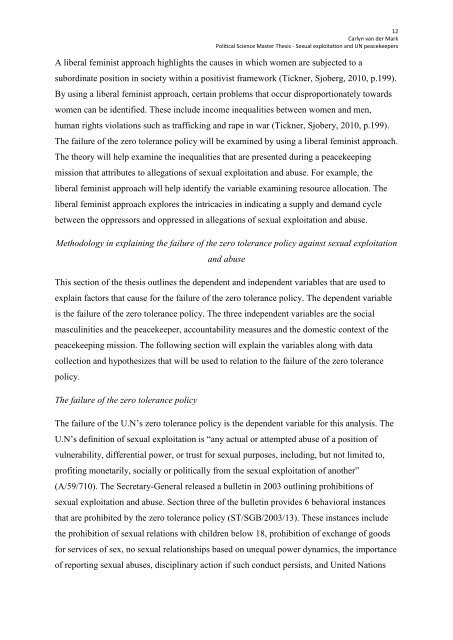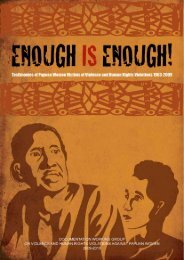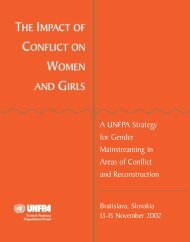Sexual exploitation and abuse by UN peacekeepers - PeaceWomen
Sexual exploitation and abuse by UN peacekeepers - PeaceWomen
Sexual exploitation and abuse by UN peacekeepers - PeaceWomen
Create successful ePaper yourself
Turn your PDF publications into a flip-book with our unique Google optimized e-Paper software.
12<br />
Carlyn van der Mark<br />
Political Science Master Thesis - <strong>Sexual</strong> <strong>exploitation</strong> <strong>and</strong> <strong>UN</strong> <strong>peacekeepers</strong><br />
A liberal feminist approach highlights the causes in which women are subjected to a<br />
subordinate position in society within a positivist framework (Tickner, Sjoberg, 2010, p.199).<br />
By using a liberal feminist approach, certain problems that occur disproportionately towards<br />
women can be identified. These include income inequalities between women <strong>and</strong> men,<br />
human rights violations such as trafficking <strong>and</strong> rape in war (Tickner, Sjobery, 2010, p.199).<br />
The failure of the zero tolerance policy will be examined <strong>by</strong> using a liberal feminist approach.<br />
The theory will help examine the inequalities that are presented during a peacekeeping<br />
mission that attributes to allegations of sexual <strong>exploitation</strong> <strong>and</strong> <strong>abuse</strong>. For example, the<br />
liberal feminist approach will help identify the variable examining resource allocation. The<br />
liberal feminist approach explores the intricacies in indicating a supply <strong>and</strong> dem<strong>and</strong> cycle<br />
between the oppressors <strong>and</strong> oppressed in allegations of sexual <strong>exploitation</strong> <strong>and</strong> <strong>abuse</strong>.<br />
Methodology in explaining the failure of the zero tolerance policy against sexual <strong>exploitation</strong><br />
<strong>and</strong> <strong>abuse</strong><br />
This section of the thesis outlines the dependent <strong>and</strong> independent variables that are used to<br />
explain factors that cause for the failure of the zero tolerance policy. The dependent variable<br />
is the failure of the zero tolerance policy. The three independent variables are the social<br />
masculinities <strong>and</strong> the peacekeeper, accountability measures <strong>and</strong> the domestic context of the<br />
peacekeeping mission. The following section will explain the variables along with data<br />
collection <strong>and</strong> hypothesizes that will be used to relation to the failure of the zero tolerance<br />
policy.<br />
The failure of the zero tolerance policy<br />
The failure of the U.N‟s zero tolerance policy is the dependent variable for this analysis. The<br />
U.N‟s definition of sexual <strong>exploitation</strong> is “any actual or attempted <strong>abuse</strong> of a position of<br />
vulnerability, differential power, or trust for sexual purposes, including, but not limited to,<br />
profiting monetarily, socially or politically from the sexual <strong>exploitation</strong> of another”<br />
(A/59/710). The Secretary-General released a bulletin in 2003 outlining prohibitions of<br />
sexual <strong>exploitation</strong> <strong>and</strong> <strong>abuse</strong>. Section three of the bulletin provides 6 behavioral instances<br />
that are prohibited <strong>by</strong> the zero tolerance policy (ST/SGB/2003/13). These instances include<br />
the prohibition of sexual relations with children below 18, prohibition of exchange of goods<br />
for services of sex, no sexual relationships based on unequal power dynamics, the importance<br />
of reporting sexual <strong>abuse</strong>s, disciplinary action if such conduct persists, <strong>and</strong> United Nations




![IANSA [PDF, 2MB] - PeaceWomen](https://img.yumpu.com/25206379/1/190x123/iansa-pdf-2mb-peacewomen.jpg?quality=85)
![Commitments Sample [PDF, 93KB] - PeaceWomen](https://img.yumpu.com/25206331/1/190x245/commitments-sample-pdf-93kb-peacewomen.jpg?quality=85)










![A Toolkit for Advocacy and Action [PDF, 260KB] - Peace Women](https://img.yumpu.com/25205989/1/190x245/a-toolkit-for-advocacy-and-action-pdf-260kb-peace-women.jpg?quality=85)